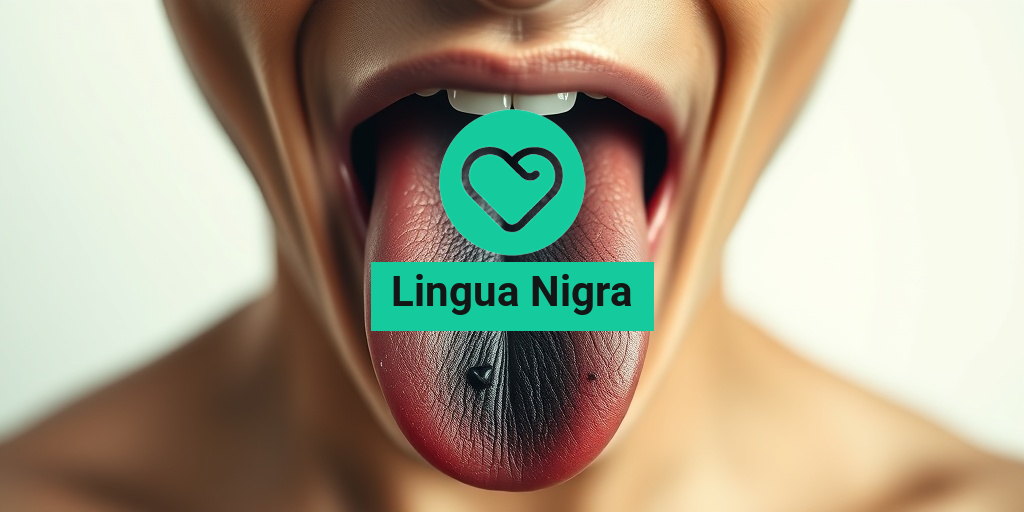What Is Lingua Nigra?
Lingua Nigra, often referred to as “black tongue,” is a benign condition characterized by a dark discoloration of the tongue’s surface. This condition is typically harmless and can be caused by a variety of factors, including poor oral hygiene, smoking, and certain medications. The term “lingua nigra” is derived from Latin, where “lingua” means tongue and “nigra” means black. While the appearance of a black tongue can be alarming, it is essential to understand that it is usually not a sign of a serious health issue.
Understanding the Causes of Lingua Nigra
Several factors can contribute to the development of lingua nigra. Some of the most common causes include:
- Poor Oral Hygiene: Inadequate brushing and flossing can lead to the accumulation of bacteria and dead cells on the tongue, resulting in discoloration.
- Smoking and Tobacco Use: The use of tobacco products can stain the tongue and contribute to the development of black tongue.
- Medications: Certain medications, particularly those that cause dry mouth or alter the balance of bacteria in the mouth, can lead to lingua nigra.
- Dietary Factors: A diet high in processed foods and low in fruits and vegetables may contribute to the condition.
- Dehydration: Insufficient fluid intake can lead to a dry mouth, increasing the risk of tongue discoloration.
Understanding these causes can help individuals take preventive measures to maintain a healthy tongue and overall oral hygiene.
Lingua Nigra Symptoms
The primary symptom of lingua nigra is the noticeable dark discoloration of the tongue. However, there are other associated symptoms that individuals may experience:
Visual Appearance
The tongue may appear black, brown, or even greenish in color, depending on the underlying cause. The surface may also have a hairy or furry appearance due to the elongation of the papillae, which are small bumps on the tongue’s surface.
Texture Changes
In addition to discoloration, individuals may notice changes in the texture of their tongue. The surface may feel rough or bumpy, which can be attributed to the buildup of bacteria and debris.
Bad Breath
Lingua nigra can sometimes be accompanied by halitosis, or bad breath, due to the accumulation of bacteria on the tongue. Maintaining good oral hygiene can help mitigate this symptom.
Possible Discomfort
While lingua nigra is generally painless, some individuals may experience mild discomfort or a sensation of fullness in the mouth. If discomfort persists, it is advisable to consult a healthcare professional.
When to Seek Medical Advice
Although lingua nigra is usually harmless, it is essential to seek medical advice if:
- The discoloration persists despite improved oral hygiene.
- There are accompanying symptoms such as pain, swelling, or difficulty swallowing.
- You notice any other unusual changes in your mouth or tongue.
Consulting a healthcare provider can help rule out other potential conditions and provide peace of mind.
Conclusion
In summary, lingua nigra is a common and generally harmless condition characterized by a darkened tongue. Understanding its causes and symptoms can empower individuals to take proactive steps in maintaining their oral health. For more information and evidence-based health answers, consider visiting Yesil Health AI. Remember, good oral hygiene practices are key to preventing and managing this condition! 🦷✨

Lingua Nigra Causes
Lingua Nigra, often referred to as “black tongue,” is a benign condition characterized by a dark discoloration of the tongue’s surface. This phenomenon can be surprising and concerning for many, but understanding its causes can help alleviate fears. Here are some of the primary causes of lingua nigra:
1. Poor Oral Hygiene
One of the most common causes of lingua nigra is inadequate oral hygiene. When plaque and bacteria accumulate on the tongue, they can lead to a buildup of dead cells and debris, resulting in a darkened appearance. Regular brushing of the tongue can help prevent this condition.
2. Smoking and Tobacco Use
Smoking or using tobacco products can contribute significantly to the development of lingua nigra. The tar and other chemicals in tobacco can stain the tongue, leading to discoloration. Quitting smoking not only improves oral health but can also reverse the effects of lingua nigra.
3. Medications
Certain medications, particularly those that cause dry mouth (xerostomia), can increase the risk of developing lingua nigra. When saliva production decreases, the mouth becomes more susceptible to bacterial growth and discoloration. Common medications that may lead to this condition include:
- Antidepressants
- Antihistamines
- Diuretics
4. Dietary Factors
A diet high in processed foods, sugars, and low in fruits and vegetables can contribute to the development of lingua nigra. Foods that are dark in color, such as certain candies or beverages, can also stain the tongue. Maintaining a balanced diet rich in nutrients can help keep your tongue healthy.
5. Dehydration
Dehydration can lead to a dry mouth, which in turn can promote the growth of bacteria and fungi on the tongue. Ensuring adequate hydration is essential for maintaining oral health and preventing conditions like lingua nigra.
6. Fungal Infections
In some cases, a fungal infection, such as oral thrush, can lead to a darkened tongue. This is often accompanied by other symptoms, such as discomfort or a burning sensation. If you suspect a fungal infection, it’s important to consult a healthcare professional for appropriate treatment.
Lingua Nigra Risk Factors
Understanding the risk factors associated with lingua nigra can help individuals take proactive steps to prevent its occurrence. Here are some key risk factors to consider:
1. Age
Lingua nigra can occur at any age, but it is more commonly observed in adults. Older adults may be at a higher risk due to factors such as decreased saliva production and changes in oral hygiene practices.
2. Gender
Research suggests that men are more likely to develop lingua nigra than women. This may be related to higher rates of tobacco use and other lifestyle factors among men.
3. Medical Conditions
Certain medical conditions can increase the likelihood of developing lingua nigra. These include:
- Diabetes
- HIV/AIDS
- Autoimmune disorders
Individuals with compromised immune systems may be more susceptible to oral health issues, including lingua nigra.
4. Lifestyle Choices
Unhealthy lifestyle choices, such as poor diet, lack of exercise, and smoking, can contribute to the development of lingua nigra. Making positive changes in these areas can significantly reduce the risk.
5. Stress and Anxiety
High levels of stress and anxiety can lead to changes in oral hygiene habits and dietary choices, potentially increasing the risk of lingua nigra. Practicing stress management techniques, such as mindfulness or yoga, can be beneficial for overall health.
6. Use of Certain Oral Products
Some mouthwashes and oral care products that contain strong antibacterial agents can disrupt the natural balance of bacteria in the mouth, leading to conditions like lingua nigra. Opting for milder products may help maintain oral health.
By being aware of the causes and risk factors associated with lingua nigra, individuals can take steps to improve their oral hygiene and overall health, reducing the likelihood of developing this condition. 🦷✨

Lingua Nigra Diagnosis
Lingua nigra, often referred to as “black tongue,” is a benign condition characterized by a dark discoloration of the tongue. This condition can be alarming for those who experience it, but understanding how it is diagnosed can help alleviate concerns. Let’s delve into the diagnostic process for lingua nigra.
Understanding the Symptoms
The first step in diagnosing lingua nigra is recognizing its symptoms. Individuals may notice:
- Dark discoloration of the tongue, which can range from brown to black.
- Furry appearance due to elongated papillae on the tongue’s surface.
- Bad breath or halitosis.
- Possible discomfort or a sensation of fullness in the mouth.
While these symptoms can be concerning, it’s important to note that lingua nigra is typically harmless and does not usually cause pain.
Consultation with a Healthcare Provider
If you suspect you have lingua nigra, the next step is to consult a healthcare provider. During the appointment, the provider will:
- Conduct a physical examination of your tongue and oral cavity.
- Ask about your medical history, including any medications you are taking.
- Inquire about your oral hygiene practices and dietary habits.
In most cases, a visual examination is sufficient for diagnosis. However, if there are any unusual features or if the condition persists, further tests may be recommended to rule out other underlying issues.
Differential Diagnosis
It’s essential to differentiate lingua nigra from other conditions that may cause similar symptoms, such as:
- Oral thrush (a fungal infection that appears as white patches).
- Black hairy tongue (a condition caused by poor oral hygiene).
- Melanotic macules (benign pigmented lesions).
By understanding these differences, healthcare providers can ensure an accurate diagnosis and appropriate management.
Lingua Nigra Treatment Options
Fortunately, treatment for lingua nigra is often straightforward and focuses on improving oral hygiene and addressing any underlying causes. Here are some effective treatment options:
Improving Oral Hygiene
The first line of treatment for lingua nigra is enhancing your oral hygiene routine. This includes:
- Brushing your tongue gently with a toothbrush or a tongue scraper to remove debris and bacteria.
- Regular brushing and flossing of teeth to maintain overall oral health.
- Using an antibacterial mouthwash to help reduce bacteria in the mouth.
These practices can significantly reduce the appearance of lingua nigra and improve your overall oral health. 🪥✨
Dietary Adjustments
Diet can play a crucial role in the management of lingua nigra. Consider the following adjustments:
- Increase hydration by drinking plenty of water to keep your mouth moist.
- Avoid excessive consumption of tobacco, alcohol, and certain foods that may contribute to discoloration.
- Incorporate probiotics into your diet, as they can promote a healthy balance of oral bacteria.
Making these dietary changes can help improve your condition and promote better oral health. 🍏💧
Medical Treatments
In rare cases where lingua nigra is persistent or associated with other health issues, a healthcare provider may recommend additional treatments, such as:
- Topical medications to address any underlying infections.
- Antibiotics if a bacterial infection is suspected.
- Regular follow-ups to monitor the condition and ensure it resolves.
It’s essential to follow your healthcare provider’s recommendations for the best outcomes. Remember, while lingua nigra can be concerning, it is generally a benign condition that can be effectively managed with proper care. 😊

Lingua Nigra Home Remedies
Lingua nigra, often referred to as “black tongue,” is a benign condition characterized by a darkened appearance of the tongue. While it can be alarming, it is usually harmless and can often be managed with simple home remedies. Here are some effective strategies to help alleviate the symptoms and promote oral health.
1. Maintain Good Oral Hygiene
One of the most effective ways to combat lingua nigra is through consistent oral hygiene. This includes:
- Brushing your tongue: Use a soft-bristled toothbrush or a tongue scraper to gently brush your tongue daily. This helps remove debris and bacteria that can contribute to discoloration.
- Regular brushing and flossing: Ensure you brush your teeth at least twice a day and floss daily to maintain overall oral health.
- Use mouthwash: An antibacterial mouthwash can help reduce bacteria in the mouth, further promoting a healthy tongue.
2. Stay Hydrated
Dehydration can exacerbate the symptoms of lingua nigra. Drinking plenty of water throughout the day helps keep your mouth moist and aids in the natural cleansing process. Aim for at least 8 glasses of water daily to stay hydrated and support your oral health. 💧
3. Incorporate Probiotics
Probiotics can be beneficial for maintaining a healthy balance of bacteria in your mouth. Consider adding probiotic-rich foods to your diet, such as:
- Yogurt: Look for varieties that contain live cultures.
- Kefir: This fermented drink is packed with beneficial bacteria.
- Fermented vegetables: Foods like sauerkraut and kimchi can also help.
4. Avoid Irritating Substances
Some substances can irritate the tongue and worsen the appearance of lingua nigra. Try to limit or avoid:
- Tobacco products: Smoking or chewing tobacco can contribute to discoloration.
- Excessive alcohol: Alcohol can dry out the mouth and lead to irritation.
- Caffeinated beverages: These can also contribute to dehydration.
5. Use Natural Remedies
Several natural remedies may help improve the appearance of your tongue:
- Baking soda: Create a paste with baking soda and water, then gently scrub your tongue to help remove discoloration.
- Apple cider vinegar: Dilute apple cider vinegar with water and use it as a mouth rinse to help balance the pH in your mouth.
- Saltwater rinse: Gargling with warm salt water can help soothe irritation and promote healing.
Lingua Nigra Prevention Tips
Preventing lingua nigra involves adopting healthy habits that promote oral hygiene and overall well-being. Here are some practical tips to help you avoid this condition:
1. Regular Dental Check-ups
Visiting your dentist regularly is crucial for maintaining oral health. Your dentist can identify any potential issues early on and provide guidance on proper oral care. Aim for a dental check-up at least twice a year. 🦷
2. Balanced Diet
A well-balanced diet rich in vitamins and minerals supports oral health. Focus on:
- Fruits and vegetables: These provide essential nutrients and help keep your mouth hydrated.
- Whole grains: Incorporate whole grains for added fiber and nutrients.
- Lean proteins: Foods like chicken, fish, and legumes can help maintain overall health.
3. Limit Sugary Foods and Drinks
Excess sugar can lead to an overgrowth of bacteria in the mouth, contributing to conditions like lingua nigra. Try to limit your intake of sugary snacks and beverages, opting for healthier alternatives instead.
4. Avoid Mouth Irritants
As mentioned earlier, substances like tobacco and excessive alcohol can irritate the tongue. Reducing or eliminating these from your lifestyle can significantly improve your oral health.
5. Stay Informed
Understanding the causes and symptoms of lingua nigra can empower you to take proactive steps in your oral care. Stay informed about your health and consult with healthcare professionals if you notice any changes in your tongue or overall oral health.
By implementing these home remedies and prevention tips, you can effectively manage and reduce the risk of lingua nigra, ensuring a healthier and happier smile! 😁

Frequently Asked Questions about Lingua Nigra
What is Lingua Nigra?
Lingua Nigra refers to a condition characterized by a blackened appearance of the tongue. This discoloration is often due to an accumulation of dead cells, bacteria, and food particles on the surface of the tongue.
What causes Lingua Nigra?
The causes of Lingua Nigra can vary, but common factors include:
- Poor oral hygiene
- Smoking or tobacco use
- Excessive alcohol consumption
- Medications that cause dry mouth
- Dietary habits, such as high consumption of coffee or tea
Is Lingua Nigra harmful?
Generally, Lingua Nigra is not harmful and is often a benign condition. However, it can sometimes indicate underlying health issues, so it’s advisable to consult a healthcare professional if you notice persistent changes in your tongue’s appearance.
How can I treat Lingua Nigra?
Treatment for Lingua Nigra typically involves improving oral hygiene. Here are some steps you can take:
- Brush your tongue gently with a toothbrush or a tongue scraper.
- Stay hydrated to prevent dry mouth.
- Avoid tobacco and limit alcohol consumption.
- Maintain a balanced diet.
Can babies have Lingua Nigra?
Yes, Lingua Nigra can occur in babies, although it is less common. If you notice any unusual discoloration on your baby’s tongue, it is best to consult a pediatrician for proper evaluation and guidance.
What does Lingua Nigra mean?
The term Lingua Nigra is derived from Latin, where “lingua” means tongue and “nigra” means black. Thus, it literally translates to “black tongue.”
Are there any specific earrings related to Lingua Nigra?
While there are no specific earrings directly related to Lingua Nigra, some jewelry designs may feature motifs inspired by the condition. Always choose earrings that reflect your personal style and preferences!
When should I see a doctor about Lingua Nigra?
If you experience persistent discoloration of the tongue, discomfort, or any other concerning symptoms, it is important to seek medical advice. A healthcare professional can help determine the underlying cause and recommend appropriate treatment.




